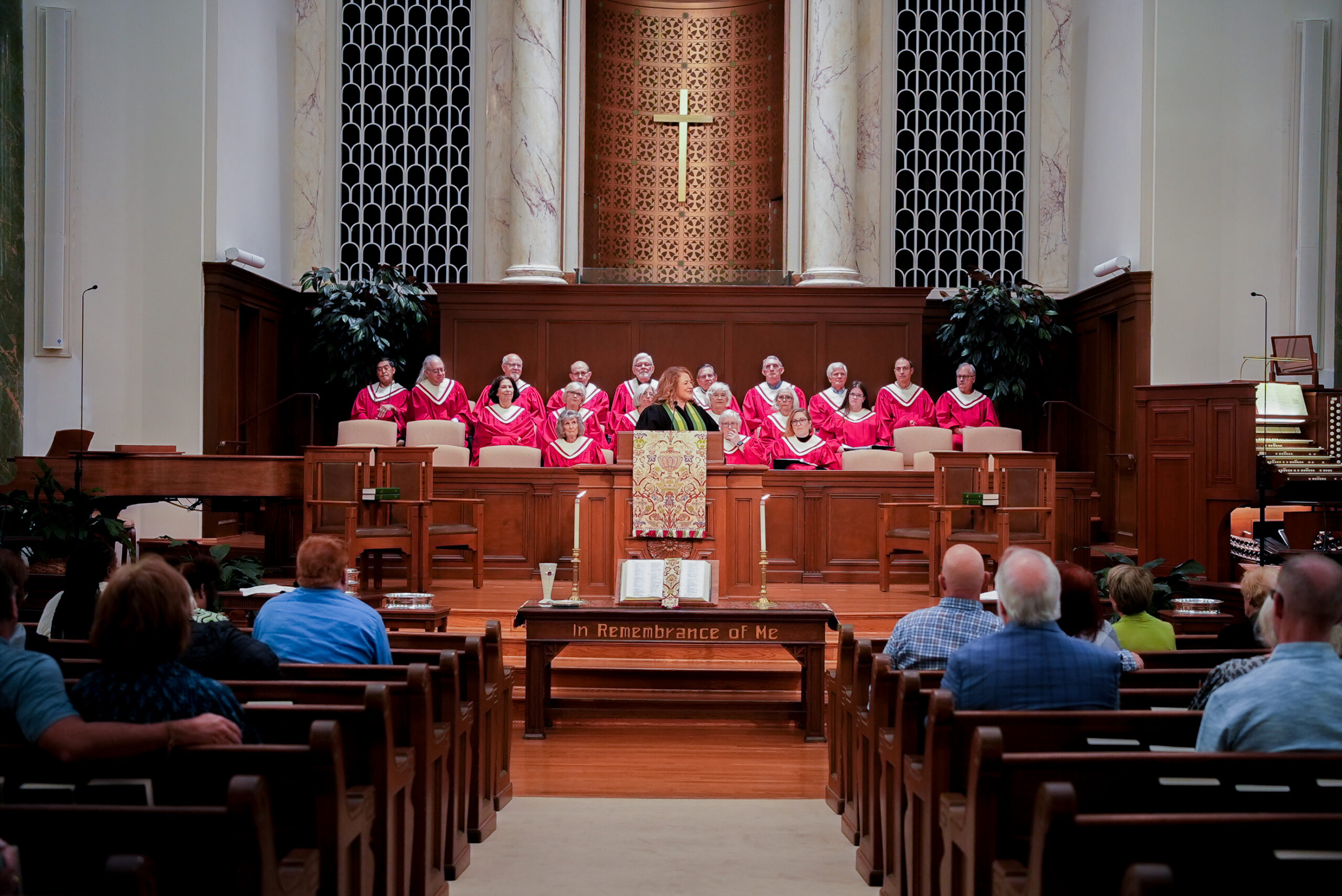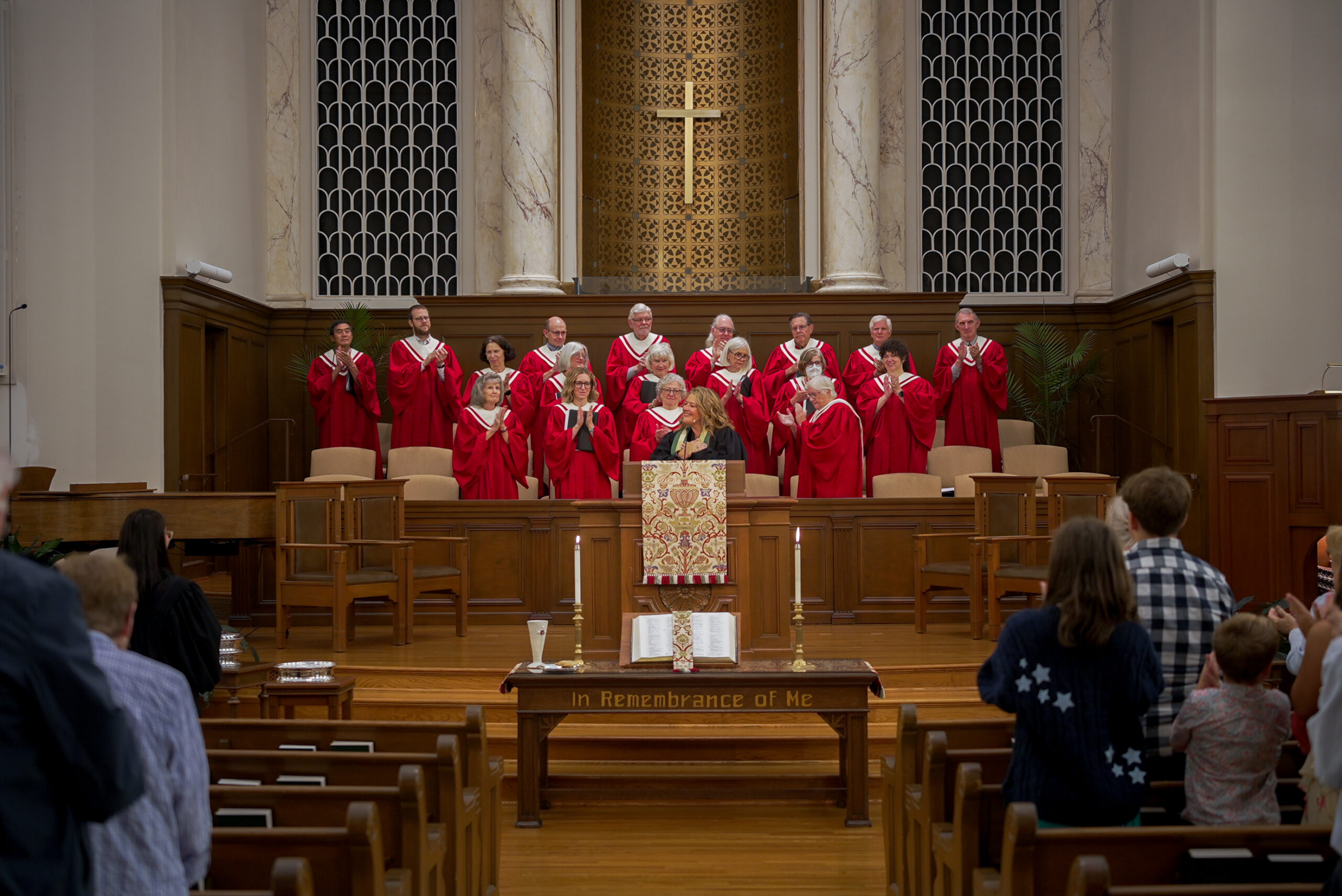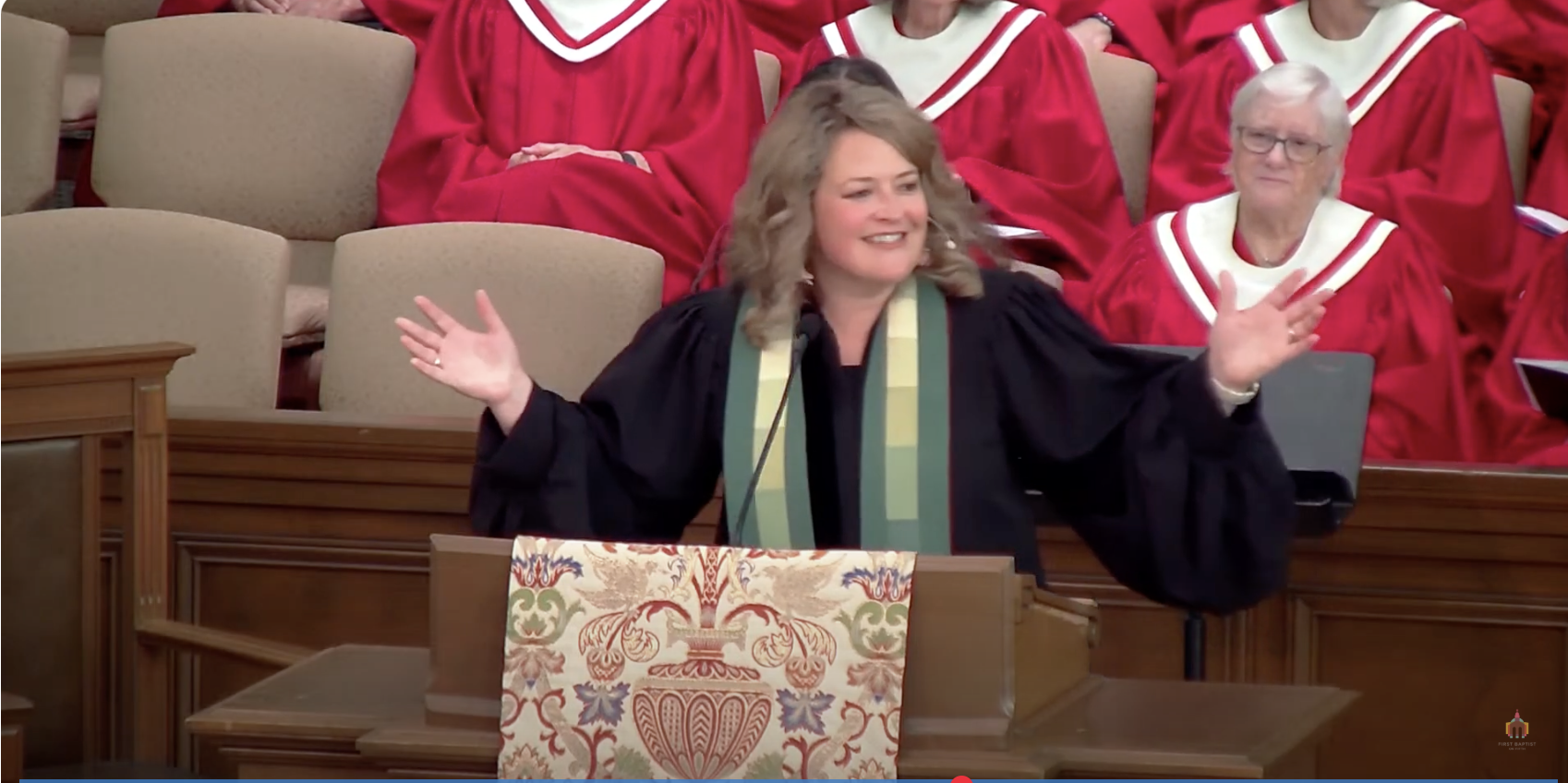I It was the summer of 1946 when a rumor began in South America that there was a famine sweeping across the continent. Despite what was being said, the crops were actually growing well, and the weather was just right for a bumper harvest that year. But on the strength of the rumor, over 20,000 small farmers abandoned their farms and fled to the nearby cities. And because of their actions, the crops failed, thousands starved, and the rumor about the famine proved to be true.1
Tending matters, you see.
II We’re spending this year together talking about the practice of “tending,” offering attention and intention to the world in which we live and move and have our being. As I have done a deep dive into the etymology of tending, I’ve learned that it comes equally from two Latin roots – “tenere,” meaning to hold or grasp; and “tendere,” meaning to stretch toward. Tending – holding or grasping or nurturing the things and people within our care, maintaining familiar rhythms or tendencies in our living, and doing so with both tenderness and tenacity. And tending – stretching toward something, holding the reach of our focus in tension as our tendons move and tense and extend outward. (All these derivatives of tend are very much intended! There I go again!)
Tending keeps us in the present moment, awake and alert and aware and attentive to what is unfolding before us. It gives us the steady practices that allow us to reach out to God, to one another, to the world, and thus be stretched by the vision and abundance that we experience. In response to stress when our “fight or flight” responses are triggered, a life of practice would offer us the possibility of “tend and befriend” instead.2 And what better way to begin our conversations about tending than with today’s parable of the sower.
IIISoils and seeds and a sower are on Jesus’ mind in today’s gospel passage, one of the classic parables he loved to share. We talked a good bit last week about parables, those simple stories using familiar artifacts of daily life — like relationships, work, economics, food, and in today’s case, seeds and soil — to instruct, provoke, refine, confront. As scholar Amy-Jill Levine says about the parables, “what makes the parables mysterious or difficult is that they challenge us to look into the hidden aspects of our own values, our own lives. They bring to the surface unasked questions, and they reveal the answers we have always known, but refuse to acknowledge.”3
A story told in three of the four gospels, Matthew’s take on the parable of the sower and the soils positions Jesus sharing with great crowds by the sea. It was his first of many parables, this one we’ll study today. “Listen!,” Jesus begins, “a sower went out to sow. Some of the seeds fell onto packed soil, and the birds ate it up. Some of the seeds fell to rocky soil, and they were scorched away. Some of the seeds fell into thorny soil, and they were choked out. Some of the seeds fell in good, rich soil, and they brought forth abundant harvest.” Like any good parable, there’s much mystery to mine here and good news to bring to the surface, but two places of focus connect us with the work of tending will focus our attention today: the hold of our soils and the stretching abundance of the sower.
IV First:the soils teach us to hold.
We only have to be a remedial gardener to know how important the soil is to the thriving of the plant, right?I’m sure you have stories of planting tomatoes or gardenias in the ground, only to find the soil wasn’t fertilized enough, or deep enough, or supple enough to receive them. When our church did our building project five years ago, I remember asking persistently why the grass wouldn’t grow and create the church’s backyard we had imagined, only to be reminded that we scattered those seeds into red clay dirt, not rich potting soil. Farmer and poet Wendell Berry once said, “The soil is the great connector of lives, the source and destination of all. It is the healer and restorer and resurrector, by which disease passes into health, age into youth, death into life. Without proper care for it we can have no community, because without proper care for it we can have no life.”4It’s no secret to us that the soil matters for the seeds it receives.
It’s also no secret to those of us who have been around a church for awhile that this parable has offered countless pastors the opportunity to tell you to examine your own soils, right?“Your life needs to be one of good soil!,” I remember a youth camp pastor once telling a room full of teenagers, “so that you can receive God’s word in your life.” We snuck looks at each other — she’s a rocky soil kinda girl, and have you seen what this guy does on the weekends? Weeds and thorns everywhere! We were warned away from lives that are rough-hewn or shallow, challenged to deeper beliefs not susceptible to being plucked up, choked out, or scorched away. For plenty of earnest and faithful followers, it has prompted a lifelong quest for improvement, for fertile and fertilized soil for our souls — maintained by regular tending: thoughtful engagement with scripture, daily prayer, and a healthy dose of pious decision-making. Not a bad quest, to be sure, but one that seemingly suggests that a life of ‘good soil’ is a static status — once you attain it, you have it, and if you don’t have it yet, good luck trying to get it.
I’d file this line of thinking away with ones that seem on the surface to be faithful, yet once you start digging below the surface — pun intended — become problematic. Because are not our lives filled with times of fertility AND of drought, times of receptivity AND of doubt? What if instead of questing after the perfect soil, we recognized that our lives actually contain the whole garden? What if we acknowledged that our lives are good gardens in which to cultivate — gardens that sometimes hold hard-packed seasons, rocky seasons, thorny seasons, as well as deep, fruitful ones? How might that understanding of the garden’s changing seasons open up deeper grace for ourselves and each other?5
Goodness knows we know about these different soils, don’t we? We’ve had those seasons where our lives feel as trodden as the paths on which we race, hardened by trauma and loss and fear and unmet expectations, our joy stolen by envy, by anger, by all that should be and isn’t. We’ve had those seasons where our spirits are shallowed by the boulders in our way, stuck again and again on that which trips us up or blocks our flow. We’ve had those seasons where we feel choked daily by distraction or old grudges or habits that deprive us of life. These hard seasons are among the very best to teach us how to tend, to illuminate for us how to hold fast to the practices that bring us life.
Our friend and former minister, John Thornton, now runs a nonprofit in Greensboro called “Held,” where people whose immediate needs outpace their ongoing income are, in fact, “held.” The folks they serve are ones who know the rocky ground of layoffs and seasons experiencing homelessness, of debt choking their thriving and suffering depriving them of hope. Through Held, folks receive a steady, regular income which substantially encourages their living, but, as John tells me, where they feel truly held is that faith-based organizations would see their lives as ones worthy of reliable, caring relationships in which to hold.6 Tending matters, you see.
Tending through the hard seasons makes us all the more ready to hold fast to the fertile ones. Yet even the most grateful among us need the reminder that vital, healthy, abundant seasons need tending. Good relationships don’t just happen. Meaningful work and delightful play aren’t just happenstance. Well-being in body, mind, heart, and soul isn’t accidental. The good soil must be fertilized and plowed, prepared and made ready for the abundance to emerge. And unlike that sweet story of Frog and Toad in their garden, who plant the seeds and sing to them, tell stories to them, talk sweetly to them, even yell at them to grow, sometimes the best tending comes, as they remind us, when we rest and let God do what God does, only to awake to sprouts pushing through the soil.7 Tending happens beyond our efforting, you see.
Second:the sower teaches us to stretch.
Reading this parable with fresh eyes reminds us that the focus isn’t on the soils, but rather that sower who went out to sow! For the sower went out to sow and threw those seeds lavishly no matter the soil. This is a sower of “reckless abandon, unchecked generosity, undisciplined abundance.”8 This is a sower who isn’t scrupulously counting every last seed so that his budget is exact, or who pessimistically predicts a poor harvest because, well, look at the ground! That’s ¾ of the seed on bad soil right there! This is not an efficient sower, or a scarcity-minded sower, or one wired for productivity and investment. This is a sower who doesn’t seem a bit fazed by our failures and rocks and thorns and doubts, and as Barbara Brown Taylor says, “just keeps on sowing, confident that there is enough seed to go around, that there is plenty, and that when the harvest comes at last it will fill every barn in the neighborhood to the rafters… a sower willing to keep reaching into his seed bag for all eternity, covering the whole creation with the fertile seed of his truth.”9 This is a sower of abundance who holds nothing back, where grace and mercy and goodness and forgiveness and love and hope are scattered widely, generously, lavishly for all to enjoy.
When conventional wisdom would have us to save only the seeds for good soil, to restrict ourselves and our relationships to only what we are certain will bear fruit, the great Sower calls us to reach out, to stretch toward the possibility of what might become. When reality would tell us to prioritize security and all that is known, the great Sower calls us to risk something big for something good.10 When “the way things are” would have us to hoard and scrimp all that we have – our love, our time, our energies, our resources, our capacities – the great Sower calls us to imagine, and practice, and nurture, and tend not to the way things are, but to “the way things could be. That great Sower talks about it – the heart, the mind, the soul, the body who is Jesus. He tells us that the kingdom or reign or dream of God for this world is at hand, that it is here and not yet, that it is just within reach.
Oh what a promise! You could say it’s the promise of a generous and grace-filled God who nevertheless persists with the lavish invitation to wholeness and transformation. You could say it’s the promise of Jesus who, as our Mennonite friends remind us, calls us to be faithful, not successful. You could say it’s the promise of a gospel that takes, blesses, breaks, and gives bread for the world. You could say it’s the promise of a kingdom where you save your life and lose it, but you could lose your life — give it, sow it, spend it, fling it with abandon — for the sake of the gospel — and save it. Tending matters, you see.
V So friends, as we begin this year of tending as individuals and as a church – may we hold and stretch. To hold – create for yourself some rhythms of tending. Find something or someone to nurture within your care. Even as you hold another with care, extend the same kindness to yourself. Start small – a 10 minute walk or time to write in a journal, a prayer while you pour your coffee, a seed pressed into good soil – and see how daily attention gives life. To stretch – discover where you need to be stretched so that you can receive the gift of abundance. Open wide your hands in the manner and spirit of the Great Sower. Find daily ways to trade scarcity for abundance, if only to be reminded that it is possible. Reach toward the hope for what can be. What might God do if we focus our attention on holding and stretching?
VI “How we spend our days, is, of course, how we spend our lives,” Annie Dillard reminds us. So may we spend our days as tenders. May we hold and grasp the variety of soils in our lives, nurturing them with practice and care. May we stretch toward and sow abundantly the seeds of love, joy, peace, patience, kindness, goodness, faithfulness, gentleness, and self control. And may we allow ourselves to be tended by a persistent, abundant sower who refuses to stop flinging lavishly the seeds of the kingdom of Love. Tending matters, you see.
Amen!




